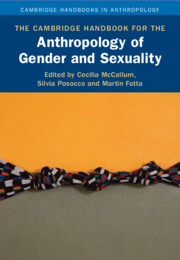Book contents
- The Cambridge Handbook for the Anthropology of Gender and Sexuality
- Cambridge Handbooks in Anthropology
- The Cambridge Handbook for the Anthropology of Gender and Sexuality
- Copyright page
- Contents
- Contributors
- 1 Introduction to The Cambridge Handbook for the Anthropology of Gender and Sexuality
- Part One Openings and Orientations
- Part Two Knowledges and Domains
- Part Three Resistances and Intersections
- 12 Social and Cultural Politics of Everyday Resistance and Empowerment
- 13 Reworking Black Feminist Anthropology through Transnational Scholar-Activism and Antiracist Solidarity in Africa and Its Diaspora
- 14 Gender in Decolonial Indigenous Perspectives
- 15 Anthropologies of Reproduction, Abortion, and Biopolitics
- 16 Gender, Capitalism, and the Erotics of Finance
- 17 Untying Poverty’s Gendered Knots Past and Present
- Part Four Desires and Relations
- Part Five Recursivities and Futures
- Name Index
- Subject Index
- References
16 - Gender, Capitalism, and the Erotics of Finance
from Part Three - Resistances and Intersections
Published online by Cambridge University Press: 29 September 2023
- The Cambridge Handbook for the Anthropology of Gender and Sexuality
- Cambridge Handbooks in Anthropology
- The Cambridge Handbook for the Anthropology of Gender and Sexuality
- Copyright page
- Contents
- Contributors
- 1 Introduction to The Cambridge Handbook for the Anthropology of Gender and Sexuality
- Part One Openings and Orientations
- Part Two Knowledges and Domains
- Part Three Resistances and Intersections
- 12 Social and Cultural Politics of Everyday Resistance and Empowerment
- 13 Reworking Black Feminist Anthropology through Transnational Scholar-Activism and Antiracist Solidarity in Africa and Its Diaspora
- 14 Gender in Decolonial Indigenous Perspectives
- 15 Anthropologies of Reproduction, Abortion, and Biopolitics
- 16 Gender, Capitalism, and the Erotics of Finance
- 17 Untying Poverty’s Gendered Knots Past and Present
- Part Four Desires and Relations
- Part Five Recursivities and Futures
- Name Index
- Subject Index
- References
Summary
Feminist anthropology has radically reworked the central terms and frameworks for how anthropology approaches the study of capitalism. Building outward from an ethnographic study of feminized microcredit loans, the argument of this chapter is that standard economic anthropology approaches to capitalism require radical reframing. This reframing calls attention to the persistent exclusions and erasures of gendered activities, spaces, roles, wealth, and work. Retheorizing capitalism from a gendered vantage point is part of a wider feminist project aimed at revealing the workings of power and domination. To do this, the chapter explores two thematic areas in the anthropology of capitalism: first, economic units such as the household, the firm, or the national economy, and, second, economic subjects such as the entrepreneur, the worker, or the consumer. Throughout, the chapter calls attention to fieldwork epistemologies in economic anthropology. The author suggests that we should recenter attention on complex and contingent ways sex powerfully shapes financial markets, and take seriously the erotic dimensions of credit on their own terms.
- Type
- Chapter
- Information
- Publisher: Cambridge University PressPrint publication year: 2023



